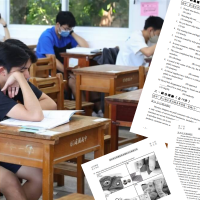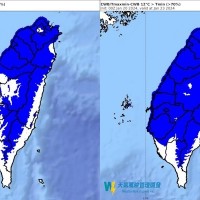TAIPEI (Taiwan News) — Taiwan is home to 735,000 migrant workers, almost entirely from Southeast Asia, 225,000 of whom are domestic migrant workers, including caregivers of children, the elderly, or the disabled.
We encounter caregivers every day — in the market, on the streets — but do we truly see them? While these workers provide invaluable contributions to the economy, they are excluded from labor laws, which rights activists say leaves them vulnerable to exploitation and abuse.
In a new documentary, Taiwan News speaks to migrant workers, activists, local NGOs, and the Ministry of Labor to shed light on these unseen people and offer solutions to Taiwan's long-term care system.
Issue 1: Labor Standards Act
Charilyn, a single mom and caregiver from the Philippines, migrated to Taiwan so she could better support her family. She worked 16 hours per day, with no day off, and followed strict rules from her employer. “They had two CCTVs where I slept … they didn’t treat me as a human,” she told Taiwan News, “If my employer treated me nicely … maybe I would still work there.”
Clara, another caregiver from the Philippines, struggled with similar issues of overwork and a lack of labor protection. When she said, “My food is not enough … I’m tired, she said her employer simply called the broker to say, “This maid, she’s complaining a lot.”
Lennon Wong (汪英達), Director of Serve the People Association (SPA), an NGO that shelters and advocates for migrant workers, said the problem rests in that caregivers are excluded from the Labor Standards Act, which provides the minimum standards for working conditions.
Taiwan News visited the Ministry of Labor (MOL) to question why no laws exist to protect caregivers. Deputy Director of the Transnational Workforce Management Team, Workforce Development Agency Su Yu Guo (蘇裕國) replied that because caregivers’ duties are unique, and their jobs are within the family household, they do not fit under the Labor Standards Act.
However, Taiwan Association of Human Rights (TAHR) Secretary-General Shih Yi Hsiang (施逸翔) said the Labor Standards Act is meant to treat all types of workers fairly. “The government should be thinking of solutions … it should be adapting to the characteristics of different industries when making policies to solve problems,” he said.
According to MOL data, caregivers worked an average of 10 hours per day, but some worked more. In addition, 74.3% of caregivers reported not receiving any time off work on weekends or holidays.
In August 2022, caregivers’ monthly minimum wage rose from NT$17,000 (US$552) to NT$20,000 (US$650), but it is still well below the minimum wage for Taiwanese workers. Moreover, while the raise may attract workers in the short term, it fails to address the real reasons behind low worker retention.
Issue 2: 1955 Hotline
1955 is a 24-hour, multi-language hotline that migrant workers can call if they encounter problems. Caregivers, most of whom live in the private households of their employers, particularly face the increased risk of sexual violence and harassment, according to the International Domestic Workers Federation (IDWF).
One caregiver named Geraldine revealed she experienced sexual harassment from the man she cared for, which lasted two years. However, when asked if she called 1955, she said, “No, actually I didn’t know what I was going to do at that time."
Shih explained that when many migrant workers face problems, they know 1955, but it may not have an effect. Migrant workers are often desperate to keep their jobs, to pay off debts, or for other reasons, so they may agree to obey their employer under pressure. He said the employer may also prevent them from calling 1955 by threatening to send them back to their countries.
According to a Garden of Hope Foundation survey, 38% of migrant caregivers reported verbal abuse, physical injury, or sexual assault by their employers. However, only 46% reported it or sought help. For those who chose not to report, 35% said they fear losing their jobs, 31% could not speak Mandarin, and 26% did not know where to go for help.
Issue 3: The Labor Brokerage System
The Labor Brokerage System is another process that activists say exploits migrant workers through excessive fees. While MOL claims that caregivers can choose whether to hire a broker, many first-time caregivers see brokers as the only viable option to work in Taiwan.
Wong said that brokers charge migrant workers a large fee for placing them with a Taiwanese employer. Migrant workers are then required to pay brokers NT$1,500 (US$50) to NT$1,800 (US$60) in monthly service fees, totaling NT$60,000 (US$1,953) over three years.
In addition, Taiwan International Workers' Association (TIWA) commissioner Betty Chen (陳容柔) said that some brokers are not honest, as she often comes across “A/B contracts,” in which a worker signs contract A with a broker, but after arriving Taiwan, follows contract B with another employer’s household.
According to Wong, “We should have a system in which the worker and employer can really understand each other. They can communicate and can really understand the work clearly, but actually, there is no such channel from the government.” “The brokers are too powerful,” he added.
In addition, migrant workers in Taiwan who need to change employers or extend a contract are charged transfer, or job-buying fees, of NT$35,000 to NT$80,000, which, according to the MOL, is against the law.
“This is a problem in the government. We don’t really have a very good long-term care system. The caretaker is only an assistant. They cannot really work as a nurse. Sometimes they really need a nurse," Wong said. “Aside from that, if they need long-term care for 24 hours, it’s already beyond the capacity of any human being. We are human, we are not robots. We cannot work for 24 hours a day,” he added.
Labor activists say that if employers are unable to pay the types of salaries needed to retain migrant caregivers, the government needs to consider using more of its long-term healthcare budget to subsidize them. “It will be a cross-ministry job … not only the MOL but also Welfare. They should organize the funds, the resources they have together so all caretakers can be assisted systematically,” Wong concludes.
Clara pleads, “We open our souls for them. We open our hearts for them to work, but hopefully, we are also hoping for them that we are also a part of their family. That’s what I want, all the employers like that. They are not thinking we are a maid, they are also thinking we are human beings.”

















